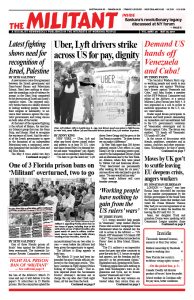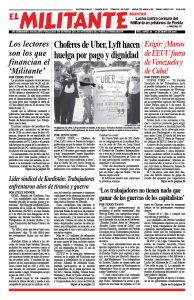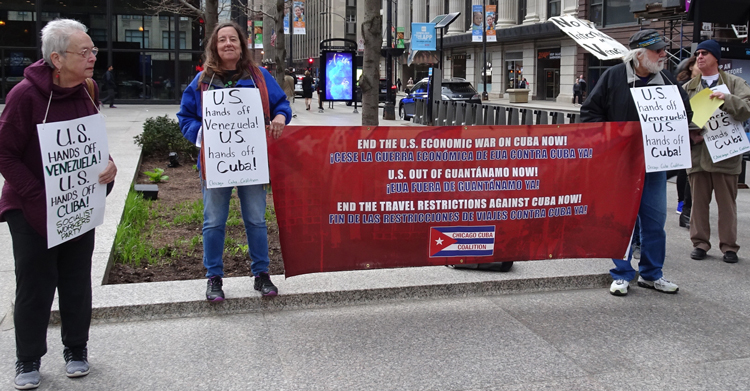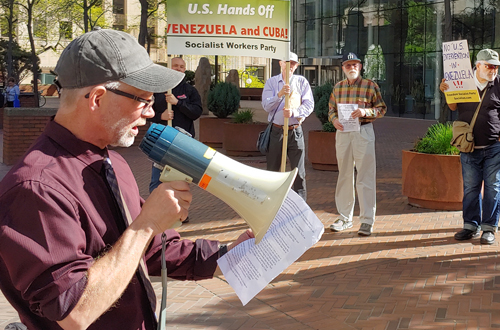“The Socialist Workers Party urges working people and youth to join in speaking out against Washington’s threats against Venezuela and Cuba,” said John Studer, a member of the SWP Political Committee and editor of the Militant, at a special Militant Labor Forum here May 4. It was organized as a call to action to mobilize opposition to the U.S. rulers’ intervention.
Studer urged forum participants to initiate and build protests demanding an immediate and unconditional halt to the U.S. government’s violations of Venezuelan sovereignty and its threats against Cuba. The forum was entitled, “US hands off Venezuela! US hands off Cuba!”
In the course of discussions with friends, neighbors, coworkers and in unions, churches and other organizations, Washington’s lie that it speaks on behalf of “the Venezuelan people” can be refuted. Many will be won to joining actions aimed at staying the hands of the U.S. rulers.
On May 5, just days after the April 30 U.S.-backed coup attempt in Venezuela by pro-imperialist opposition figure Juan Guaidó failed, Secretary of State Mike Pompeo reiterated that Washington had “a set of options that would involve use of U.S. military” in Venezuela. Washington seeks ways to use the deepening political and social crisis facing working people there to oust the government of President Nicolás Maduro and impose a regime more pliant to the interests of the U.S. rulers.
But U.S. military intervention is opposed even by many in Venezuela who do not support Maduro, Studer noted.
He pointed to President Donald Trump’s threat to impose a “full and complete embargo” of Cuba, which would be an escalation of the U.S. rulers’ decadeslong efforts — carried out by both Democratic and Republican administrations — to overturn the socialist revolution made by Cuba’s workers and farmers.
“A full embargo could only be imposed with a naval blockade, which would be the equivalent of an act of war,” Studer said. “At the moment these are threats, but we have a responsibility to mobilize opposition to them becoming actions by Washington.”
Washington has already imposed a series of new sanctions against the Cuban Revolution, he said, and, for the first time, invoked Title III of the Helms-Burton Act, which allows for U.S. individuals and corporations to sue companies worldwide that make use of properties nationalized in the revolution.
Rulers’ extension of assaults at home
“Washington’s threat to the sovereignty of these two Latin American nations is an extension of the assaults U.S. bosses are carrying out against the wages, working conditions and political rights of working people at home,” Studer said.
“Every fight working people here carry out against U.S. imperialism’s violation of the sovereignty of other countries is a step towards us acting independently of the bosses and their political parties. It points to the rulers as the source of the problems we face and strengthens working-class unity.
“No war or other intervention by the U.S. imperialists has ever advanced the interests of working people anywhere. Not in Syria, Iraq, Afghanistan, Korea, Vietnam, not anywhere,” he added.
He pointed out that the SWP’s opposition to U.S. imperialist intervention in the colonial and semicolonial world is rooted in the continuity of the communist movement dating back 100 years. The Communist Party in the U.S. was launched in 1919, inspired by the Bolshevik Revolution in Russia led by V.I. Lenin, and the Bolshevik Party’s fight for a revolutionary working-class program against the degeneration and betrayal of the old Socialist International.
Those parties adapted to their own capitalist classes and supported the slaughter of millions in the rulers’ interests in the first imperialist World War.
The SWP “stands for the immediate and unhampered right of self-determination” for all the “territories, colonies, and dependencies of the U.S. and for the withdrawal of all troops from them,” Studer said, quoting the SWP’s 1938 Declaration of Principles.
A couple of meeting participants had just returned from joining hundreds of thousands of working people celebrating International Workers Day at demonstrations in Havana and other Cuban cities, May 1. They said that many Cubans at these actions took the opportunity to voice their opposition to Trump’s recent steps to tighten Washington’s punishing embargo of Cuba.
Today Washington demands the Cuban government withdraw the 20,000 Cubans currently in Venezuela. It falsely claims the internationalist volunteers there — who are overwhelmingly medical personnel, teachers, and sports and art instructors — are all soldiers.
There is unanimity among the U.S. ruling class on policy towards Venezuela and Cuba, Mary-Alice Waters, a leader of the SWP, told the meeting. “Democrats Alexandria Ocasio-Cortez and Bernie Sanders don’t want to touch this question. But among working people broad support can be won for opposing Washington’s intervention.”
One participant asked Studer about the impact of the widespread shortages of medicine and food in Venezuela.
Working people there need the time and space free of imperialist intervention “to build the leadership they require to advance their struggles, under the difficult conditions confronting them,” he explained. Fighting to keep Washington off the backs of the people of Venezuela “is the solidarity we offer to fellow working people there.”



